Center for Justice & Economic Advancement
Normalizing Education Resource Center
A First-Person Look at Second Chances:
Breaking Barriers to Education and Employment in Prison
INNOVATIVE PolicIES, advocacy, and changing narratives are key for Normalizing Opportunity for people with records
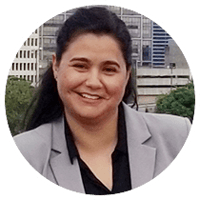
By Alexa Garza
Follow Alexa Garza’s journey through the walls of prison education and the maze of reintegration struggles, as she shares insights on breaking barriers and advocating for second chances.
In a society driven by judgment and prejudice, I’ve often found myself a captive of my past, unable to make change no matter how much I want to. As someone who has been through the criminal legal system, my experience has taught me the importance of being seen for the person I am today rather than defined solely by my past mistakes.
A Barrage of Barriers
I was a teenager when I found myself surrounded by walls, entombed; I thought my life was over. My existence was on pause within the rigid enclosure. It was a suffocating experience. My dreams and aspirations, once burning brightly, became mere echoes of what could have been. The sunshine that made its way through the tiny cracks in the walls came in the form of education. I was assigned to the Mountain View Unit in Gatesville, Texas. It was one of the few correctional units that, through Central Texas College, offered college programming to women who were incarcerated.
I was determined to not let my past define my future. I thought that enrolling in college would provide me with an opportunity to acquire knowledge and serve as a platform for personal growth and transformation.
I was naïve in my thinking. I came to realize that support for any educational programming simply did not exist for women within the system. The majority of prison officials did not care if we wanted to improve ourselves. We were to be punished, nothing more. We were never to forget that we were security threats, and therefore did not deserve anything. Not even education.
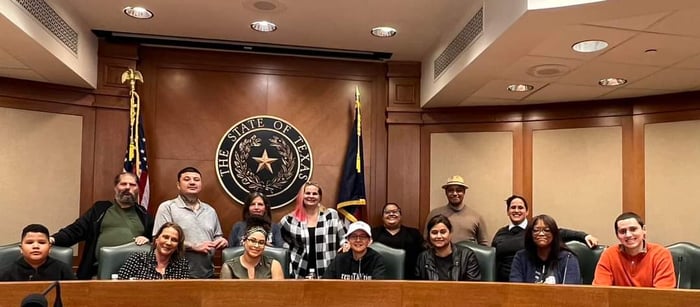 Classes were scheduled to start at 5:45 p.m. but typically began around 6:30 due to any number of mishaps. We were to be ready at 3:45. We would sit and wait for an officer to escort us to the front gate where we were strip-searched. Our textbooks and homework were inspected for contraband. Disciplinary cases were written if we were found to have used our school-issued notebook paper for anything other than schoolwork or if we had more than the allotted amount of paper.
Classes were scheduled to start at 5:45 p.m. but typically began around 6:30 due to any number of mishaps. We were to be ready at 3:45. We would sit and wait for an officer to escort us to the front gate where we were strip-searched. Our textbooks and homework were inspected for contraband. Disciplinary cases were written if we were found to have used our school-issued notebook paper for anything other than schoolwork or if we had more than the allotted amount of paper.
Next, we were handcuffed and loaded onto a van or bus to be transported half a mile down the street. The transportation vehicles are not well ventilated, therefore they are extremely hot in the summer, with temperatures reaching the triple digits, or freezing cold in the winter, so much so that you can see your fingertips turning blue during the ride.
Once we arrived at the college unit, we were strip-searched again and escorted to the education building. Usually by this point, I was nauseated from being in a moving vehicle, and I had been made to get naked twice. And then I had to gather myself to be mentally acute and productive and attend class.
"I came to realize that support for any educational programming simply did not exist for women within the system. The majority of prison officials did not care if we wanted to improve ourselves. We were to be punished, nothing more. We were never to forget that we were security threats, and therefore did not deserve anything. Not even education."
We were marched in a single file line to the education building where the officer would issue us a three-inch pencil with no eraser and five sheets of notebook paper, stamped with “PROPERTY OF TDCJ” in large black ink across the top of the page. The stamp made it seem like my own thoughts were not my own but property of the State.
The instructors did their best to provide us with the same teaching experience as in the “free world.” However, they also were subject to the pat-downs and inspections for contraband. They saw firsthand the daily drama of life on the inside and did not remain in these positions for very long.
Halfway through class time, occasionally, the officer allowed for a bathroom break. Only two “offenders” at a time, since groups are not allowed to loiter in the hallways. It’s not safe. Security comes first no matter what. The general sentiment during class time was security, not rehabilitation, not education. But more often than not, security would “forget” to give us a bathroom break, so we often expected to be unable to relieve ourselves for the duration of our “college” time. Because of this, I have seen grown women urinate on themselves and then have to sit in soiled garments for the remainder of the night. We received our education through the filter of punishment.
At 8:45 p.m. classes are dismissed. We would be stripped again and made to wait for the transportation vehicle to return us to our home units. Since trying to arrive on time for the class was the priority, returning us to our dorms to eat, rest, or shower was a perpetual afterthought. We usually returned after 10:30 and would be stripped for the fourth time before we were finally able to get back to our dorms.
In spite of the long hours, the strip searches, and the inability to relieve myself for hours, I was willing to endure. For 12 years, I endured the inhumane cruelty that accompanied my education. I endured through limited course offerings that started out as five classes a week and then dwindled to only one. The classroom became my sanctuary where I was defined solely on my intellectual contributions rather than my past mistakes. No matter what, I chose to endure.
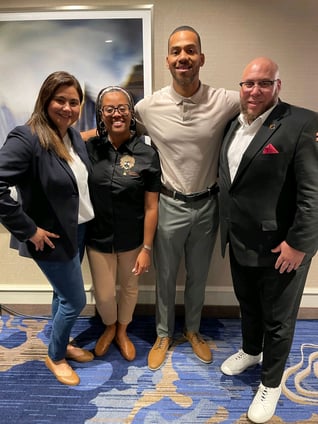
“For 12 years, I endured the inhumane cruelty that accompanied my education. I endured through limited course offerings that started out as five classes a week and then dwindled to only one. The classroom became my sanctuary where I was defined solely on my intellectual contributions rather than my past mistakes. No matter what, I chose to endure."
The Real World
Despite the transformative power of education, my euphoria associated with earning a degree quickly dissipated after my release. I was blindsided by a series of barriers that hindered my reintegration. The moment I stepped foot outside of the prison, I was confronted with a society that viewed me through the distorted lens of my mistakes.
In spite of my bachelor’s degree, newfound knowledge, and drive to succeed, I was often met with skepticism and prejudice during the job application and interview process. The experience of having served time in prison was a perpetual thorn in my side.
One of the mandatory conditions of my parole was to be employed. I was unable to adjust to being free without the looming urgency of finding a job. I applied as a waitress at a family-owned steak house. The application did not ask about my criminal history, and I was lucky for this oversight as it allowed me to get a job easily. However, this was not often the case. I was denied a position as a cashier at an aluminum recycling center because I was told by HR that the company was a “family business,” and I would not fit into the culture. This was after two interviews and receiving an offer letter. In another instance, a manager had to “fight” with HR because the organization’s policy clearly states that background checks only go back seven years. My conviction being 25 years old should not have been an issue.
I was also unable to rent an apartment in my name due to lack of rental history and inability to pass a background check. I was denied a credit card because of lack of credit history. I quickly learned what a secured bank loan was—I basically had to borrow my own money and pay interest on it in order to begin establishing credit.
I applied to graduate school at the same university system where I received my undergrad degree only to be denied because of my criminal record. There was no clear pathway for me to continue my education.
Finding a Second Chance
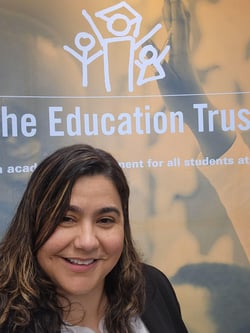 A pivotal point in my life was when I applied and was selected for the Education Trust Policy Fellowship. The Education Trust (Ed Trust) is a national nonprofit committed to advancing policies and practices to dismantle the racial and economic barriers embedded in the American education system. Haunted by the preconceived notion that I wasn’t good enough, I almost didn’t apply. It was only after relentless encouragement from a friend that I submitted my application.
A pivotal point in my life was when I applied and was selected for the Education Trust Policy Fellowship. The Education Trust (Ed Trust) is a national nonprofit committed to advancing policies and practices to dismantle the racial and economic barriers embedded in the American education system. Haunted by the preconceived notion that I wasn’t good enough, I almost didn’t apply. It was only after relentless encouragement from a friend that I submitted my application.
For a national organization to normalize opportunities for and actively seek out individuals impacted by the legal system, and offer financial support for our time and expertise, was monumental. The fellowship is designed to highlight the capabilities and accomplishments of those directly impacted by incarceration and instruct us in policy fundamentals. As a fellow, I was able to draw on my lived experience in pursuing higher education while incarcerated to review, amplify, and inform Ed Trust’s policy recommendations for justice-impacted students.
I developed a deeper understanding of my own value, strengths, and weaknesses and increased my self-awareness and sense of purpose. I realized that my unique perspective, as someone who lived through the failures of the criminal legal system, provided me with a powerful tool to advocate for change. No longer do I accept the status quo regarding educational gender disparities within the criminal legal system. Instead, I seek to challenge the existing system and structures, and I strive to create a better process for all incarcerated students. Sharing my story and highlighting the hurdles of navigating correctional educational programming allows me to humanize the issue and stress the urgency for reform.
From Policy to Impact
“When policy and advocacy are aligned, they create a powerful synergy that drives positive transformation with lasting impact."
Normalizing opportunity for people with records requires more than a piecemeal approach to updating individual policies or programs. It requires a comprehensive and interconnected policymaking strategy that focuses on people, places, and systems.
Through my fellowship, I have learned that policy defines the rules and regulations that govern a society or an organization; advocacy seeks to influence and shape those policies and address specific issues or promote certain causes. When policy and advocacy are aligned, they create a powerful synergy that drives positive transformation with lasting impact.
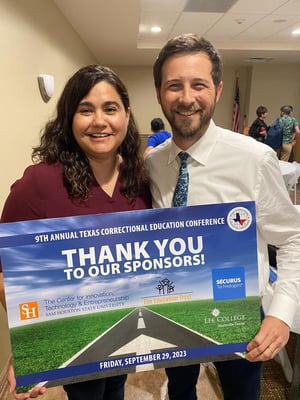
In this most recent Texas legislative session, I, along with several criminal justice advocacy organizations, advocated for the passing of Senate Bill 1146, which “[relates] to the medical transportation and care for certain inmates in the Texas Department of Criminal Justice.” I provided testimony to the Texas House and Senate Corrections Committee using my lived experience, educating the committee members on the inhumane conditions that female inmates are subjected to during medical transport.
I believe that when individuals come together with shared values, experiences, and a desire to address important social issues, they become a force that reshapes institutions and creates lasting impact. By amplifying and centering the voices of those of us with lived experience, we can normalize opportunities for people with records and advocate for fairer policies that promote equity and social justice.
If society recognizes the importance of second chances, we must then implement policies and fund initiatives that evaluate individuals based on their capabilities, talents, and personal growth, rather than reducing them to a single checked box indicating criminal history. Those of us that have been incarcerated have the ability to change, grow, and contribute positively to society. I firmly believe that society should be reevaluating the way we perceive individuals who have been incarcerated. Focus on who they are now and provide them with the opportunity to successfully rejoin communities and make a meaningful impact on the world.


